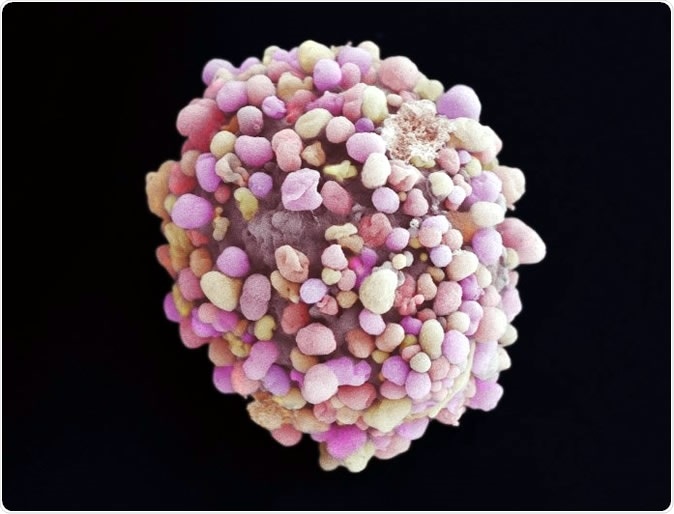
A new type of drug that blocks one of cancer’s key evolutionary escape routes from chemotherapy could be used to treat aggressive breast cancers, a new study has shown. Breast cancer cell. Image credit: Anne Weston, Francis Crick Institute via the Wellcome Collection.
One of the impediments faced by patients with breast cancer is treatment or drug resistance. Many patients who experience breast cancer relapse struggle with treatment since the cancer cells become resistant to treatment.
The new drug, known as BOS172722, can block one of cancer’s key evolutionary escape routes from chemotherapy. It works by forcing cancer cells through mitosis or cell division too rapidly, driving fatal errors in parceling out DNA.
Battling resistance in breast cancer
Even when a cancer treatment initially works by shrinking tumors or keeping the tumor from growing or spreading to other parts of the body, they can become resistant to the treatment over time. Past studies have shown that cancer cells become resistant when they evolve to develop methods to circumvent the mechanisms by which the treatment works.At present, the treatments available for advanced breast cancer can only help prolong life and improve quality of life, but it’s incurable. These treatments can’t get rid of all cancer that has spread to the other organs.
The treatment plan focuses on many facets, including characteristics of the tumor cells, the symptoms present, where cancer has spread, and past breast cancer treatments performed. Usually, the treatments include immunotherapy, chemotherapy, and radiation therapy. However, many patients develop drug resistance, which, in turn, can lead to a poor prognosis.
The new study, which was published in the journal Molecular Cancer Therapeutics, could pave the way to reduce the risk of resistance in patients with breast cancer. The drug BOS172722, which is a new evolution-busting therapy, works by blocking a molecule dubbed as MPS1 or mucopolysaccharidosis type 1.
MPS1 plays a pivotal role in controlling mitosis or cell division. It is responsible for arranging the chromosomes during mitosis to make sure they are evenly and correctly distributed between daughter cells. It ensures that the division of cells doesn’t fast forward inappropriately until they have been parceled out properly and evenly. In the division of cancer cells, if a new drug will block MPS1, it will lead to the cancer cells speeding through cell division, receiving the wrong number of chromosomes. As a result, the cancer cells will die.
“We have discovered a brand-new type of cancer treatment that uses cancer's rapid growth against it, by forcing cells through cell division so quickly that they accumulate fatal errors. The drug works especially well in combination with chemotherapy in triple-negative breast cancer cells - the deadliest form of breast cancer for which there are few successful treatments,” Spiros Linardopoulos, Professor of Cancer Biology and Therapeutics at The Institute of Cancer Research, said.
"Crucially, the combination is anticipated to be effective in cancer patients that have already become resistant to chemotherapy alone and has the potential to become a much-needed extra treatment option that could extend the lives of patients,” he added.
The phase 1 of the drug trial is currently underway. If the new drug will be effective during the clinical trial, it will move forward to phase II, and eventually, a new drug for metastatic and resistant breast cancer is soon to become a promising way to battle the deadly disease.
The researchers suggest that if the drug would be combined with standard chemotherapy, it can provide a new way to treat triple-negative breast cancer, a type of breast cancer that does not have any receptors that are typically found in breast cancer. This means that the growth of the cancer is not fueled by the hormones, progesterone, and estrogen, or by the HER2 protein. These are the targets of current therapies to fight breast cancer.
Journal reference:
Anderhub, S., Mak, G.W., Gurden, M., Faisal, A., Drosopoulos, K., Walsh, K., Woodward, H., Innocenit, P., Westwood, I., Naud, S., Hayes, A., Theofani, E., Filosto, S, Saville, H., Burke, R., van Montfort, R., Blagg, J., Hoelder, S., Eccles, S., and Linardopoulos, S. (2019). High Proliferation Rate and a Compromised Spindle Assembly Checkpoint Confers Sensitivity to the MPS1 Inhibitor BOS172722 in Triple-Negative Breast Cancers. Molecular Cancer Therapeutics. https://mct.aacrjournals.org/content/18/10/1696






No comments
Post a Comment